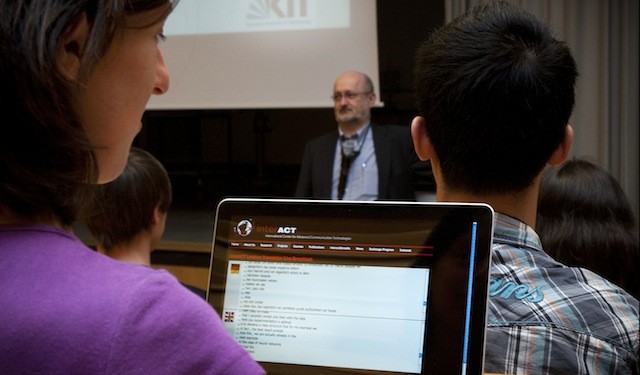Pioneering technology that translates lectures into English in real-time could make it easier for universities to recruit students overseas. The technology, which is being developed by Karlsruhe Institute of Technology (KIT) in Germany, automatically records and transcribes a lecture, then translates it into English.
News and business analysis for Professionals in International Education
Have some pie!
Germany trials “real-time” translation in lectures
 Lectures are automatically translated from German into English, and displayed in real time on students' computers
Lectures are automatically translated from German into English, and displayed in real time on students' computers The results appear almost simultaneously on a student’s laptop or smart phone, like subtitles on a film.
“The translation is not always perfect,” said developer, professor Alex Waibel. “But it is part of the language tools [through] which students can better follow lectures in spite of language barriers.”
Students trialling the technology in KIT’s Department of Informatics and Mechanical Engineering said it was effective and easy to use, despite initial glitches.
“As an Indonesian, I was having difficulty to understand the German lectures, but with this technology I’m not feeling helpless anymore,” Indonesian Karl Karnadi said.
“The idea of the translator system itself is very interesting and has made us foreign students feel more accepted and welcomed,” he added.
“This has made us foreign students feel more accepted and welcomed”
Such reactions will be welcomed by developers who hope the service will make German universities more attractive to international students.They say those from overseas prefer to study in English, viewing German as hard to learn, and that leading German universities are missing out.
“At KIT, we have about 16% of foreign students. At [some] universities in the USA, this share amounts to about 50%. In international competition for the best scientists, we are still behind,” Professor Horst Hippler, president of KIT, said.
Developers say the translator should be extended to support a larger number of subjects and languages in future, as well as to universities worldwide. They said it would benefit not only foreign students, but also those with impaired hearing.
“Hopefully, generations of students worldwide will profit from it soon,” said Theresia Bauer, minister of science, research and the arts for the state of Baden-Württemberg, earlier this month.
Still looking? Find by category:



3 Responses to Germany trials “real-time” translation in lectures